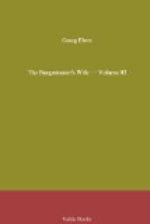When the two men were seated opposite to each other in the tap-room, the fencing-master pushed his moustache away from his lips, and began: “How long ago is it-? We’ll say fifteen years, since I was riding to Haarlem with the innkeeper Aquarius, who as you know, is a learned man and has all sorts of old stuff and Latin manuscripts. He talks well, and when the conversation turned upon our meeting with many things in life that we fancy we have already seen, remarked that this could be easily explained, for the human soul was an indestructible thing, a bird that never dies. So long as we live it remains with us, and when we die flies away and is rewarded or punished according to its deserts; but after centuries, which are no more to the Lord than the minutes in which I empty this fresh mug —one more, bar-maid—the merciful Father releases it again, and it nestles in some new born child. This made me laugh; but he was not at all disturbed and told the story of an old Pagan, a wonderfully wise chap, who knew positively that his soul had formerly lodged in the body of a mighty hero. This same hero also remembered exactly where, during his former life, he had hung his shield, and told his associates. They searched and found the piece of armor, with the initials of the Christian and surname which had belonged to the philosopher in his life as a soldier, centuries before. This puzzled me, for you see—now don’t laugh—something had formerly happened to me very much like the Pagan’s experience. I don’t care much for books, and from a child have always read the same one. I inherited it from my dead father and the work is not printed, but written. I’ll show it to you some time—it contains the history of the brave Roland. Often, when absorbed in these beautiful and true stories, my cheeks have grown as red as fire, and I’ll confess to you, as I did to my travelling-companion: If I’m not mistaken, I’ve sat with King Charles at the board, or I’ve worn Roland’s chain armor in battle and in the tourney. I believe I have seen the Moorish king, Marsilia, and once when reading how the dying Roland wound his horn in the valley of the Roncesvalles, I felt such a pain in my throat, that it seemed as if it would burst, and fancied I had felt the same pain before. When I frankly acknowledged all this, my companion exclaimed that there was no doubt my soul had once inhabited Roland’s body, or in other words, that in a former life I had been the Knight Roland.”
The musician looked at the fencing-master in amazement and asked: “Could you really believe that, Captain?”
“Why not,” replied the other. “Nothing is impossible to the Highest. At first I laughed in the man’s face, but his words followed me; and when I read the old stories—I needn’t strain my eyes much, for at every line I know beforehand what the next will be—I couldn’t help asking myself—In short, sir, my soul probably once inhabited Roland’s body, and that’s




